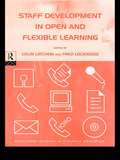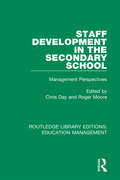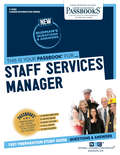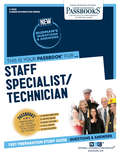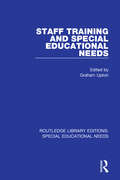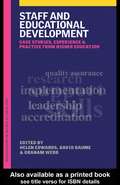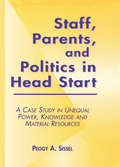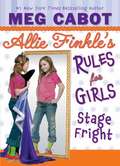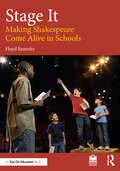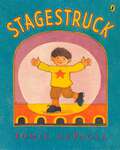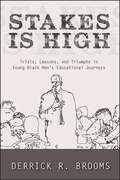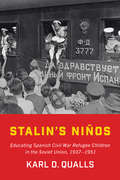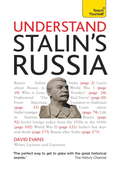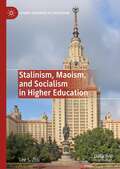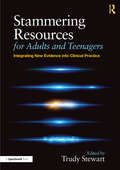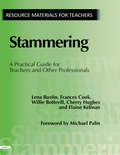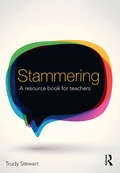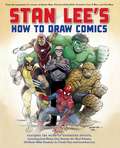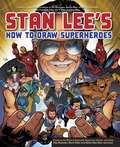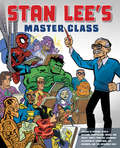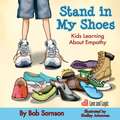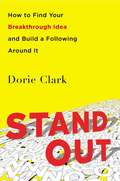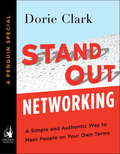- Table View
- List View
Staff Development in Open and Flexible Education
by Fred Lockwood Colin LatchemAs institutions and organisations around the world move to more open and flexible delivery of educational and training programmes, there is increasing need for effective forms of staff development to encourage and support change. Staff development is not only critical in helping teachers and trainers acquire and improve their knowledge and skills in alternative modes of delivery, but in helping to shape the policies, procedures and attitudes that are needed for more learner-centred approaches. This book draws together the experiences, insights and findings of some of the world's leading staff developers in open and flexible education. It is designed to provide an overview of the trends, influences and events which are shaping the work of these professionals, and the policy changes, processes and outcomes they are helping to bring about in this expanding field. The book offers various frameworks and strategies for staff development activities, with examples from commercial, professional and educational settings, and shows how these can be refined and adapted to more specific contexts.
Staff Development in the Secondary School: Management Perspectives (Routledge Library Editions: Education Management)
by Chris Day and Roger MooreOriginally published in 1986. Those involved in management in schools are being urged to develop their management skills and many courses are developed for this purpose. At the same time many new issues have arisen which require attention from managers in schools. These include: staff appraisal, curriculum evaluation and action research. This book examines major topics of present concern in the management of secondary schools. It presents much new thinking on these major problems and reports on particular initiatives. The aim is to help improve practice, both by helping trainers focus their courses correctly and by encouraging those involved in school management to approach their work more purposefully. School management is treated from the perspective of the industrial trainer, the Local Education Authority, higher education and the school practitioner.
Staff Services Manager: Passbooks Study Guide (Career Examination Series)
by National Learning CorporationThe Staff Services Manager Passbook® prepares you for your test by allowing you to take practice exams in the subjects you need to study. It provides hundreds of questions and answers in the areas that will likely be covered on your upcoming exam, including but not limited to: Principles, practices and trends of public and business administration; Budgeting, personnel services, management analysis and program planning and evaluation; Supervision and training; Equal Employment Opportunity roles and objectives; Analyzing data; Understanding and interpreting written material; Reviewing and editing written reports; and more.
Staff Specialist/Technician: Passbooks Study Guide (Career Examination Series)
by National Learning CorporationThe Staff Specialist/Technician Passbook® prepares you for your test by allowing you to take practice exams in the subjects you need to study. It provides hundreds of questions and answers in the areas that will likely be covered on your upcoming exam, including but not limited to: analytical ability; mathematical and statistical abilities; office communication skills; English usage; and more.
Staff Training and Special Educational Needs (Routledge Library Editions: Special Educational Needs #56)
by Graham UptonFirst published in 1991. This work is about training and special education needs in the international arena. The book was commissioned as a result of the 1990 International Special Education Conference in Cardiff. The contributors, from the USA, Canada, Africa and the United Kingdom, have focused on innovative approaches to staff training. The identification of a contribution as innovatory has been done on the basis of either the description of an alternative method of planning or delivery, a focus of a frequently ignored client group or in relation to the existence of specific problems which affect the provision of training.
Staff and Educational Development: Case Studies, Experience and Practice (Case Studies of Teaching in Higher Education)
by Graham Webb Helen Edwards David BaumeMaintaining the practical and interactive focus of the series, this book features a collection of case studies of best practice from around the world, covering different situations, environments and course types. They include key areas such as skills, research, supervision and curriculum change and development, support services, implementing change, leadership, quality assurance and improvement and accreditation. The studies are presented in such a way as to encourage readers to engage in critical reflection. After each one, its author provides a thorough analysis of the case, teasing out key issues and providing links to research and experience in the area.
Staff, Parents and Politics in Head Start: A Case Study in Unequal Power, Knowledge and Material Resources (Studies in Education/Politics #No. 4)
by Peggy A. SisselThis book takes the reader inside the workings of Head Start, drawing attention to the inequalities in power, knowledge, and material resources that exist in the United States. It traces the dialectical relationship between the thoughts and actions of staff members and parents.
Stage Fright (Allie Finkle's Rules For Girls #4)
by Meg CabotThe fourth grade puts on a play written by Mrs. Hunter! Allie is sure she will walk away with the most coveted role that of the princess, naturally -- but one of her friends gets the part! What Allie doesn't realize is that the part she does get -- that of the evil queen -- is actually the starring role. But Allie isn't content with just starring in the play. She goes full-on method and borrows some false eyelashes to wear for the play, which causes a great deal of excited controversy. Allie learns it's not the size of the part, it's the size of the heart that matters.
Stage It: Making Shakespeare Come Alive in Schools
by Floyd RumohrStage It provides a simple-to-follow roadmap for teachers to help students dive into the dramatic, romantic, and playful world of Shakespeare. Originating from the highly successful NYC-based arts education program, Stages of Learning, this resource enables your drama, arts, or ELA class to learn the basics of Shakespeare's language, themes, characters, introductory staging, and directing. Designed for busy teachers, Stage It enables you to choose your own adventure depending on time, grade level collaboration, and student interest. This professional teacher’s guide has simple-to-use instructions and worksheets, such as acting tools for instruction about the plot synopsis, cast of characters, and paraphrasing; and directing tools for tips about the play and the theater-making process. Accompanying the book online are abridged versions of four of Shakespeare’s well-known plays: Hamlet, Henry V, Julius Caesar, and Othello, as well as paraphrasing worksheets, a culminating performance program template, and more. Stage It meets or exceeds many standards-based frameworks including New York State Learning Standards in the Arts, benchmarks of the New York City Blueprint for Teaching and Learning in the Arts K-12: Theater, the U.S. Common Core/State Standards, and National Arts Standards. Teachers of students aged 9–12, as well as educators in after-school or community programs, can foster a deep connection to the material through a gradual process that engages everyone in the classroom. This approach not only brings Shakespeare's timeless stories to life but also cultivates essential skills like public speaking, teamwork, and self-expression for students of all identities.For more information on Floyd Rumohr and the book, visit www.stageitplays.com.
Stagestruck
by Tomie dePaolaTommy is so excited. His first-grade class is putting on a play about Peter Rabbit, and he&’s sure to get the starring role. But in his enthusiasm, Tommy talks too much in class, so his teacher decides that he should play Mopsy instead—and Mopsy doesn&’t have any lines! Tommy is disappointed until he gets an idea. If he can&’t be the star, he can still get the audience&’s attention by reacting to everything Peter Rabbit does. But how will Tommy&’s mother and teacher react to his performance?
Stakes Is High: Trials, Lessons, and Triumphs in Young Black Men's Educational Journeys (SUNY series, Critical Race Studies in Education)
by Derrick R. BroomsDrawing on interviews that span over seven years, Derrick R. Brooms provides detailed accounts of a select group of Black young men's pathways from secondary school through college. As opposed to the same old stories about young Black men, Brooms offers new narratives that speak to Black boys' and young men's agency, aspirations, hopes, and possibilities. Even as they feel contested and constrained because they are Black and male, these young men anchor their educational desires within their families and communities. Critical to their journeys are the many challenges they face in public discourse and societal projections, in their home neighborhoods and schooling community, in educational environments, and in their health and well-being. In charting these challenges and the high stakes of the trials, lessons, and triumphs they experience, Brooms shows that we cannot understand the educational journeys of Black boys and young men without accounting for the full sociocultural contexts of their lives and how they make sense of those contexts.
Stalin's Niños: Educating Spanish Civil War Refugee Children in the Soviet Union, 1937–1951
by Karl D. QuallsStalin’s Niños examines how the Soviet Union raised and educated nearly 3,000 child refugees of the Spanish Civil War. An analysis of the archival record and numerous letters, oral histories, and memoirs reveals that this little-known story exemplifies the Soviet transformation of children into future builders of communism and illuminates the educational techniques shared with other modern states. Classroom education taught patriotism for the two homelands and the importance of emulating Spanish and Soviet heroes, scientists, soldiers, and artists. Extra-curricular clubs and activities reinforced classroom experiences and helped discipline the mind, body, and behaviors. Adult mentors, like the heroes studied in the classroom, provided models to emulate and became the tangible expression of the ideal Spaniard and Soviet. The Basque and Spanish children thus were transformed into hybrid Hispano-Soviets fully engaged with their native language, culture, and traditions while also imbued with Russian language and culture and Soviet ideals of hard work, comradery, internationalism, and sacrifice for ideals and others. Even during their horrific evacuation to the Soviet interior during World War II, the twenty-two Soviet boarding schools designed specifically for the Spanish refugee children – and better provisioned than those for Soviet children – served these displaced niños for fourteen years and transformed them into Red Army heroes, award-winning Soviet athletes and artists, successful educators and workers, and aids to Fidel Castro in building Cuba after his revolution. Stalin’s Niños also sheds new light on the education of non-Russian Soviet and international students and the process of constructing a supranational Soviet identity.
Stalin's Russia: Teach Yourself Ebook
by David EvansUnderstand Stalin's Russia is a compelling introduction to a man and a nation long enveloped in mystery. It covers all aspects of this fascinating history, from the shadows of Tsarism and the legacy of Lenin, to the implications of Stalin's rule - including the horrific effects of the five-year plans, and the heroic but costly triumph in the Great Patriotic War.
Stalinism, Maoism, and Socialism in Higher Education (Global Histories of Education)
by Lee S. ZhuThis book is a comparative study of the endeavors to create a socialist system of higher education in the Soviet Union under Stalin and in China under Mao. It is organized around three themes: the convergence of Maoism with Stalinism in the early 1950s, which induced the transnational transplantation of the Soviet model of higher education to China; historical convergence between Stalinism of the First Five-Year Plan period (1928–1932) and Maoism of the Great Leap period (1958–1960), which was prominently manifested in Soviet and Chinese higher education policies in these respective periods; the eventual divergence of Maoism from Stalinism on the definition of socialist society, which was evinced in the different final outcomes of the Maoist and Stalinist endeavors to create a socialist system of higher learning.
Stammering Resources for Adults and Teenagers: Integrating New Evidence into Clinical Practice
by Trudy StewartThis comprehensive and practical resource is a second volume to the highly influential Dysfluency Resource Book (2010). It brings together the very latest developments in the field of stammering and dysfluency in adults and teenagers and builds upon some of the approaches explored in the Dysfluency Resource Book. The book draws on the expert knowledge of contributors from a wide range of fields, such as specialist speech and language therapy, education, psychology and youth work, with a focus on presenting practical guidance for those working in this complex area. This valuable resource: • Has chapters exploring the latest clinical developments, such as acceptance and commitment therapy (ACT) and narrative therapy. • Provides in-depth discussion of some established therapeutic practices, including avoidance-reduction therapy and group work. • Offers concrete application to theory, both the social and medical models, guiding the reader on how to integrate new evidence into clinical practice. • Provides a wealth of activities and photocopiable handouts that can be used in practice. Designed for clinicians and students working with teenagers and adults who stammer, this flexible and practical book embeds an ethos of reflection and adaptation. The detailed overview of therapeutic approaches allows the reader to explore a wide range of techniques, building a strong foundation of knowledge from which to tailor and develop their own practice.
Stammering: A Practical Guide for Teachers and Other Professionals (Jkp Essentials Ser.)
by Elaine Kelman lena Rustin Frances Cook Willie Botterill Cherry HughesThis book provides essential information and guidance about stammering for those working in educational settings. The highly experienced team of authors demonstrates how early intervention is essential if children who stammer are to have the best chance of recovery; the practical strategies that can help with children's oral participation in class, particulary in the light of recent innovations such as the literacy hour and national numeracy strategy; the ways in which teachers can address the educational and social implications of stammering, and reverse the risk of underachieving if these children become isolated, anxious, withdrawn or disruptive; how to influence the climate in schools so that children who stammer are better understood and can be helped to their full potential; and how to prepare pupils for exams, particularly in secondary schools where they may be taking oral examinations. Throughout the text, reference is made to new government initiatives where appropriate, and each chapter includes case studies, practical tasks and activities that can be used in the school setting.
Stammering: A resource book for teachers (Overcoming Common Problems Ser.)
by Trudy StewartWhat is stammering? How does it present itself? When does it occur? Why does it happen? What are the most effective strategies you can use to help? Providing background information about stammering as well as a wide range of tools and strategies, this practical book addresses the key challenges faced at nursery and school. There are separate sections on early years, primary and secondary level and include the most common areas that teachers must consider when supporting children who lack speech fluency, including: identifying children at risk of developing a stammer how to manage incidents of stammering how to manage classroom communication and oral participation helping children to make and maintain relationships help children to manage feelings associated with stammering working alongside speech and language therapists. Recent changes to the curriculum means that there is now a greater demand on children’s communication skills than ever. This book will help you provide the necessary support to a child who stammers by offering a clear explanation of the presentation of stammering and the best ways you manage the occurrence of stammering in a range of school contexts. Full of tips and advice this book will enable teachers and other professionals to work effectively with a child who stammers. This accessible book is essential for anyone concerned about a child in their care who presents with a stammer, including teachers, student teachers, SENCOs and parents.
Stan Lee's How to Draw Comics: From the Legendary Creator of Spider-Man, The Incredible Hulk, Fantastic Four, X -Men, and Iron Man
by Stan Lee John Romita Gil Kane Neal Adams Jack KirbyIn Stan Lee's How to Draw Comics, Stan Lee reveals his secrets for: * Costumes * Penciling, Inking & Coloring * Lettering & Word Balloons * Digital Advances * Perspective & Foreshortening * What Makes Great Action * Page & Panel Layout * Covers * Creating a Portfolio * Getting WorkWhen it comes to comic books, one name says it all: Stan Lee. His characters are classics. His industry knowledge is vast. His creativity is boundless. And now, he's sharing what he knows with you, Grasshopper! His cohorts have always been--and still are--some of the best in the business: Jack Kirby, John Romita, Sr., Neal Adams, Gil Kane, Mike Deodato, Jr., Frank Cho, and Jonathan Lau, and many others, Stan includes their work here and discusses what exactly makes it so great. He touches on all the important stuff: anatomy, foreshortening, perspective, action, penciling, inking, hand lettering vs. digital lettering, color, character and costume design, panel flow, materials and tools, computers, file formats, and software. He includes an overview of the history and development of the comic book industry, and there's an extensive section on various types of covers--the super important element that makes the reader want to pick up that comic! In a world where good battles evil at every turn and the hero fights valiantly to get the girl, no stone is left unturned! Here you'll also find info on all the small details--that really aren't so small: word balloons, thought balloons, whisper balloons, bursts, sound effect lettering, and splash pages! And KA-BLAMMM! . . . once you've created your art, then what? Lest you think Stan would turn you out into the wilderness without a road map, fellow traveler, there's also information on preparing and submitting your portfolio, on getting work, and on suggested reading and schools. Stan Lee's How to Draw Comics features a cover that reunites long time collaborator John Romita Sr. and original cover artist of How to Draw Comics the Marvel Way. John Romita Sr. was most famous for his collaboration on The Amazing Spider-Man with Stan Lee!It's time for a new approach . . . "a cornucopia of cutting-edge, techno-savvy instructions to lead you down the freshly laid yellow brick road of creativity." It's time for a book that takes you on the new journey of creating comic books for the 21st century and beyond! Excelsior!From the Trade Paperback edition.
Stan Lee's How to Draw Superheroes: From the Legendary Co-creator of the Avengers, Spider-Man, the Incredible Hulk, the Fantastic Four, the X-Men, and Iron Man
by Stan Lee Steve Ditko Jack Kirby Alex Ross John BuscemaThe third installment in comics icon Stan Lee's series showing readers how to draw some of the most exciting and dynamic superheroes of all time. Spider-Man, the X-Men, the Fantastic Four, Iron Man, the Incredible Hulk, and the Avengers all share a common trait -- these hugely popular Marvel Comics superheroes were co-created by the legendary Stan Lee. Now, Lee shows readers everything they'll need to make their own mighty superheroes, just like his classic creations. Lee exposes his secret tools and techniques for bringing strong, inspiring heroes and heroines to life. He even shows aspiring creators how to expand their super-universes with evil villains, trusty sidekicks, brutes and monsters, super-pets, secret hideouts, and more! These invaluable insights from one of the greatest superhero creators of all time are must-haves for all fans of Lee's legendary superhero comic work.
Stan Lee's Master Class: Lessons in Drawing, World-Building, Storytelling, Manga, and Digital Comics from the Legendary Co-creator of Spider-Man, The Avengers, and The Incredible Hulk
by Stan LeeFrom the co-creator of the Mighty Marvel Universe and some of the most popular comic book characters of all time comes an in-depth comics drawing instruction book revealing the tools, styles, and techniques of today's top comics artists.Focusing on topics like anatomy, perspective, and character design, as well as brand new topics like manga art styles, digital art, and more, Stan Lee's Master Class is the next step for those looking to perfect their superhero rendering and create fantastic worlds perfect for today's modern comic book audience. With examples from his classic collaborations at Marvel Comics and from today's top comics artists, Lee builds on concepts only touched upon in his previous instructional offerings and provides a pathway for aspiring artists to bring their comic book artwork to professional-quality levels.Advance praise for Stan Lee&’s Master Class&“Stan Lee dedicated his life to perfecting the art and craft of comic book storytelling. Stan Lee&’s Master Class distills his decades of experience into practical and clearly explained lessons to help you make the best comics you can. It&’s like having Stan looking over your shoulder.&”—Danny Fingeroth, longtime colleague of Stan Lee, and author of A Marvelous Life: The Amazing Story of Stan Lee
Stand Beautiful - picture book
by Chloe HowardTeach your child the importance of embracing their uniqueness, celebrating the differences in others, and having a positive outlook with Stand Beautiful. International speaker, TEDx speaker, and anti-bullying author Chloe Howard shows kids that they are perfect in their own imperfect ways.With humor and heart, Chloe and her friends take a road trip to encourage others who are struggling with loving themselves. After learning about their issues, Chloe and her friends spread positivity with easy-to-remember affirmations:Be proud of who you are.Stand up and accept yourself.Boldly face your beautiful self.Rock your differences.I am the best me there is.Stand Beautiful features colorful and adorable illustrations by Deborah Melmon. This picture book will help children ages 4 to 8 who struggle with issues stemming from anxiety, bullying, self-esteem, confidence, and acceptance.Born with a clubfoot, author Chloe Howard had five major operations by the time she was fifteen. Through her hardships, she learned that each of us is perfect in our own imperfect way. Chloe wants to help your child stand beautiful too!
Stand In My Shoes: Kids Learning About Empathy
by Bob Sornson Shelley JohannesWhen Emily asks her big sister what the word empathy means, Emily has no idea that knowing the answer will change how she looks at people. But does it really matter to others if Emily notices how they're feeling? Stand in My Shoes shows kids how easy it is to develop empathy toward those around them. Empathy is the ability to notice what other people feel. Empathy leads to the social skills and personal relationships which make our lives rich and beautiful, and it is something we can help our children learn. This book teaches young children the value of noticing how other people feel. We're hoping that many parents read it along with their children.
Stand Out
by Dorie ClarkStanding out is no longer optionalToo many people believe that if they keep their heads down and work hard, they'll be recognized on the merits of their work. But that's simply not true anymore. "Safe" jobs disappear daily, and the clamor of everyday life drowns out ordinary contributions. To make a name for yourself, to create true job security, and to make a difference in the world, you have to share your unique perspective and inspire others to take action. But in a noisy world where it seems everything's been said--and shouted from the rooftops--how can your ideas stand out?Fortunately, you don't have to be a genius or a worldwide superstar to make an impact. Drawing on interviews with more than fifty thought leaders in fields ranging from business to genomics to urban planning, Dorie Clark shows how these masters achieved success and how anyone--with hard work--can do the same. Whether it's learning to ask the right questions, developing and building on an expert niche, or combining disparate fields to get a new perspective, Clark outlines ways to develop the ideas that set you apart.Of course, having a breakthrough insight is only half the battle. If you really want to share your ideas, you have to find a way to build an audience, communicate your message, and inspire others to embrace your vision. Starting small is fine; Clark provides a step-by-step guide to help you leverage your existing networks, attract new people to your cause, and, ultimately, build a community around your ideas.Featuring vivid examples based on interviews with influencers such as Seth Godin, David Allen, and Daniel Pink, Clark shows you how to break through and ensure that your ideas get noticed. Becoming a thought leader in your company or in your profession is the ultimate career insurance. But--even more important--it's also a chance to change the world for the better. Whatever your cause, perspective, or point of view, the world can't afford for the best ideas to remain buried inside you. Whether it's how to improve the educational system or how to make your company more efficient, your ideas matter. The world needs your insights, and it's time to be bold.From the Hardcover edition.
Stand Out Get into a Dream School: Seven Steps to Help Your Child Get into a Top College
by Rachel CollinsStand Out Get into a Dream School, written by a Stanford admissions insider, reveals the secrets that lead students to be admitted into the college of their dreams. Students and parents are flummoxed with the question of why one student with the same grades and test scores gets in while another does not. For the first time, a Stanford admissions insider, Rachel Collins, reveals the secrets that leads students to be admitted. In the five easy steps revealed in Stand Out Get into a Dream School, Rachel explains exactly what students need to do to ensure their success. The formula laid out in Stand Out Get into a Dream School provides students an easy path to admission while also providing parents ways in which to help make their child’s dream a reality. Within its pages, parents learn how to help their child identify strategies, engage their child’s passion, and help their child get admitted to at least one dream school. The college admissions landscape has changed, and Rachel Collins is here to help students and parents navigate it.
Stand Out Networking
by Dorie ClarkFew professional activities are as nerve-wracking as networking. There's the paralyzing prospect of entering a room full of strangers. The awkward introductions and stilted small talk. The concern that "networking" means you have to exploit others for personal gain - or might appear that way. It's no wonder so many talented professionals eschew networking altogether. Unfortunately, that means they're limiting their chances of making the kind of great personal and professional connections that can expand their worldview, enrich their lives, and - yes - even lead to new business opportunities. That's why it's time to reclaim networking. It doesn't have to be the province of users and takers; instead, as Forbes and Harvard Business Review contributor Dorie Clark makes clear in this short and actionable guide, networking done right is nothing like the stereotype. It's not about making shallow, insincere connections and filling your wallet with business cards. Instead, the real goal is to turn brief encounters into mutually-beneficial and lasting friendships--in both your personal and professional life. Drawing on wisdom from her own experience and from experts like psychologist Robert Cialdini, marketer Michael Katz, and authors Judy Robinett and Keith Ferrazzi, Clark provides valuable insight on how to be a good networker, including concrete tips on how to: - Turn initial small talk into meaningful exchanges - Unlock the power of social media as a networking tool - Transform casual online contacts into real-world connections - Make the most of conferences - Set a schedule for keeping in regular touch with your network - Repair and strengthen troubled relationships - Create your own events and become a connector Whether you're an introvert or extrovert, and whether you currently relish or loathe making new connections, Clark will teach you the strategies you need to make networking fun, joyful, and enriching.
